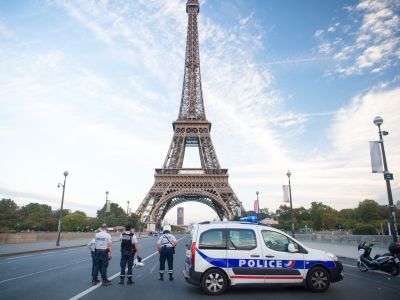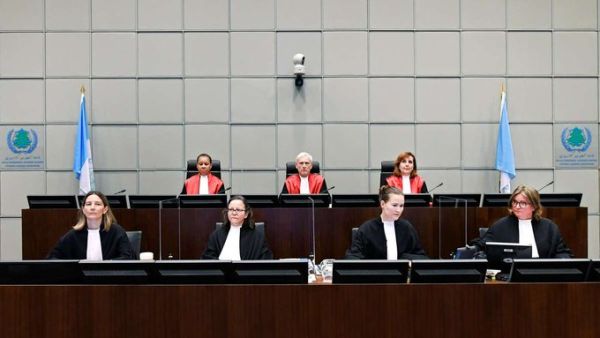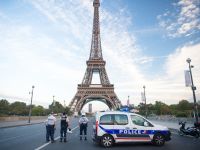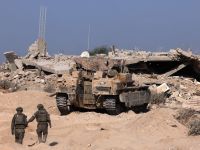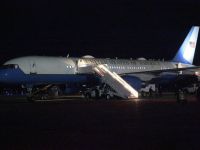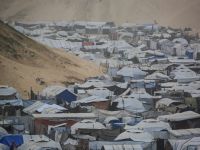The UN-backed Special Tribunal for Lebanon said Tuesday that there was no evidence that either the Syrian regime or Hezbollah's leadership had any involvement in the murder of former Prime Minister Rafik Hariri along with 21 other people in 2005.
The STL began its long-awaited verdict session in the trial against four alleged assassins that killed the former prime minister 15 years ago.
The case is based almost entirely on evidence gathered from mobile phone records, with the prosecution having examined millions of calls and text messages from the time leading up to Hariri's assassination.
Admitting that the evidence is circumstantial, the trial chamber said that it was possible to identify "striking patterns" to suggest that four different networks of "interconnected and coordinated" mobile phones were consistently triggering the same cellphone towers as those triggered by Hariri and his entourage.
This data suggests that the accused were coordinating the attack on Hariri and surveilling him in the run-up to the assassination.
The STL trial chamber noted that there was "overwhelming Syrian dominance" in Lebanon from the end of the Civil War and at the time of Hariri's assassination.
It added that Hariri was known for his vocal support in 2004 for UN Security Council Resolution 1559, which called for disarming the militias and the withdrawal of foreign troops from Lebanon.
Hariri had been planning to participate in the 2005 elections on a platform pledging to push for Syria's withdrawal from Lebanon.
Judge David Re said that the trial chamber found that the Syrian regime and Hezbollah "may have had motives to eliminate Mr. Hariri and his political allies" but that there is no direct evidence that either had any involvement in his murder.
The SLT found beyond reasonable doubt that a suicide bomber triggered the attack, but said that it was not possible to identify who detonated the bomb.
Instead, Judge Janet Nosworthy said that 92 pieces of an unknown male were found at the blast site, and that this man may have been the suicide bomber.
Notesworthy added that the crime scene was not secured properly, that evidence was damaged or removed following the attack, and that there had been “gross deficiencies in the initial investigation" into the attack.
The STL is conducting the judgement in absentia, as the whereabouts of the four Hezbollah members accused of killing Hariri is unknown.
Salim Jamil Ayyash, Hassan Habib Merhi, Hussein Hassan Oneissi and Assad Hassan Sabra are charged with conspiracy to commit a terrorist act, intentional homicide, attempted intentional homicide, and other related charges.
The trial chamber presented evidence from a 2,600-page verdict file and said that cellphone data proved that Ayyash was in Lebanon at the time of the attack and that he used a mobile phone that was critical in the plot.
It said that Hezbollah military commander Mustafa Badreddine, who was originally on trial but died in 2016, also was the sole user of a cellphone used to coordinate and exchange information with other cellphones involved in the plot against Hariri.
The trial chamber meanwhile could not conclude that Sabra was the single user of one of those phones.
The judgement session comes as Lebanon deals with the fallout of the massive Beirut Port explosion that killed at least 180 people, injured 7,000 more and left the population seething with anger at the negligence and corruption of the authorities.
Divisions have emerged over demands for an international inquiry to be held into the blast – a call that has been rejected strongly by President Michel Aoun and Hezbollah’s leader Sayyed Hasan Nasrallah.
The STL originally scheduled the judgement for Aug. 7 but postponed it for two weeks in the wake of the blast, "out of respect for the countless victims.”
Although Hezbollah itself is not on trial, Nasrallah has repeatedly said that he does not accept the tribunal’s jurisdiction, independence, or judgements.
"We do not feel concerned by the STL's decisions," he said in a televised address Aug. 14. "For us it will be as if no decision was ever announced ... If our brothers are unjustly sentenced, as we expect, we will maintain their innocence."
Former Prime Minister Saad Hariri, Rafik Hariri's son and political heir, was attending the session. He is expected to make a statement after the verdict.
STL prosecutors assert that the late prime minister was assassinated because he was a “serious threat” to Syrian interests in Lebanon. He maintained close ties with the United States, Western and Gulf Arab states, and was against Iranian and Syrian interference in Lebanon.
This article has been adapted from its original source.


